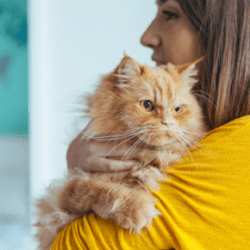Vet James Carpenter shares advice on dealing with an anxious cat
Pet Anxiety Week is in May each year and the team at Estcourt Vets have some important advice for pet owners in Wiltshire on the topic.
What is anxiety?
Anxiety is a sense of unease because of worry or fear – a feeling we have all felt throughout our lives. Anxiety can be mild or severe and can manifest in most animals too, including our feline friends. In our article, Vet James Carpenter shares their advice on dealing with an anxious cat and understanding what might be causing it.
If, after reading our article you would like some further advice for your cat, please do contact our Estcourt Street team.
What causes anxiety in cats?
Cats can be anxious due to many different factors including pain, illness, neglect, lack of socialisation, contact with new people, animals or situations, and trauma.
Anxiety can manifest in a variety of symptoms which James advises you can look out for at home. It is important to be able to spot signs of anxiety in your cat and recognise how they respond and what they need in those situations.
What are the signs of cat anxiety?
Any threats cats encounter can cause anxiety. Whether we think an experience is threatening or not is irrelevant as the cat will still feel as though they are in danger. When a cat feels threatened, they are likely to apply strategies to protect themselves. Here are some signs of anxiety James has seen:
- Hiding – The cat will attempt to remove themselves from the situation and seek out an area where they feel safe.
- Aggression – If the cat feels trapped, they may feel they need to attack to protect themselves.
- Restlessness – The cat may pace around, tremble, and increase grooming.
- Decreased appetite, affection and willingness to socialise – this symptom comes with the feeling of stress and potential involuntary defecation.
- Salivation, dilated pupils and flat ears – as a panic response.
- Increased respiratory rate if stressed.
- Holding their tail against their body as a defence mechanism.
Contact us for help with cat anxiety
How can cat anxiety be treated?
If you see signs of anxiety, try James’ tips below to help your cat:
- Try comforting them but remember not to reward fearful behaviour.
- Never punish your cat as this will only increase the anxiety and potentially cause aggressive behaviour.
- Do not cage or confine them.
- Provide a safe, protective environment for them i.e., less stresses, limit to familiar people.
- A vet may prescribe medication or treatment if there are underlying causes of pain.
- You may need professional advice on behaviour modification – including desensitisation and counterconditioning – talk to our team about this.
The best course of action is to try to prevent the anxiety to begin with. If you are adopting a kitten, allow them to be social and experience different environments so their confidence grows, and they can better deal with overwhelming situations.
If you require any advice regarding your cat’s anxiety and behaviour, do contact our vet practice in Devizes and we will do our very best to help your cat through their issues.
< Back to articles Estcourt Vets Devizes
Estcourt Vets Devizes